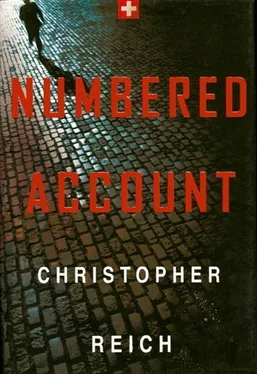“And were we able to route the transaction through Medusa?” Kaiser referred to the on-line data management system that had become operational only two days before.
“Yes, Herr Kaiser. Sprecher’s and Neumann’s terminals have been altered to share access with it. No sign of our client’s transfer will be detectable.”
“Just in time,” whispered Kaiser gratefully. He’d been aware for years that the intelligence agencies of several Western nations possessed technology capable of tapping into their main data banks. The Americans were especially crafty. Their first line of attack was the sophisticated communications technology that allowed them to listen verbatim to the interbank conversations carried on between Cerberus and its computer brethren around the world. Transfers of funds made from Zurich to New York or from Hong Kong to Zurich were easily intercepted.
Medusa was the answer to these unwarranted incursions: a state-of-the-art encryption system capable of detecting and defeating any and all on-line surveillance measures. When Medusa was fully up and running, USB would be able to conduct her private banking the old-fashioned way: privately. But it had not come cheap. One hundred million francs had been allocated for the development, construction, and implementation of Medusa. And one hundred fifty million spent. What were hidden reserves for?
A firm knock on the oak door interrupted Kaiser’s thoughts.
“Good morning, Herr Kaiser, Herr Dr. Ott,” said Sylvia Schon. “I have Mr. Neumann’s dossier.”
Ott walked briskly to meet her and thrust forward his right hand, palm up. “The file please. You may go.”
“Not so quickly,” said Kaiser. He walked the length of the room and extended his hand. He had forgotten how attractive she was. “Dr. Schon, a pleasure to see you.”
She looked questioningly at Ott, then walked past him and handed the file to Kaiser. “Neumann’s file as requested.”
Kaiser accepted the file. “He’s one of your boys. Any word on how he is faring?”
“Nothing but praise from Mr. Sprecher.”
“Given his decision to leave the bank, I don’t know precisely how to evaluate that. What about you? Had a chance to get to know him?”
“Only briefly. We had dinner last night.”
“Where?” He couldn’t prevent himself from asking.
“Emilio’s.”
Kaiser raised an eyebrow. “I see. Maybe Konig has a point about using our assets better. If you took every one of your recruits there, we’d have to file for bankruptcy within a week.”
“I thought the bank should ensure he feels welcome.” Sylvia Schon darted a glance at Rudolf Ott.
“I’m hardly one to tell you how to do your job,” said Kaiser. “Neumann’s special. His father was very close to me. Fine man. Fine son. And how does Mr. Neumann feel about our “proposed cooperation’? Get a chance to discuss that with him?”
“We touched on the matter. He mentioned in no uncertain terms that he thought it unwise for the bank to cooperate with the authorities. He said ‘the walls of the bank should be made of granite, not sandstone.’”
Kaiser laughed. “Did he? How refreshing for an American.”
Sylvia Schon advanced a step. “Has he gotten into any trouble? Is that why you wished to see me?”
“On the contrary. Seems our boy has a nose for keeping us out of trouble. We’re thinking about bringing him to the Fourth Floor. I need another assistant.”
“Mr. Feller isn’t bearing up under the increased pressure,” added Ott malevolently.
Sylvia Schon raised a hand in protest. “Mr. Neumann has been here less than two months. Maybe after a year, he could assume a position on the Fourth Floor. He’s hardly begun his employ.”
Kaiser knew the promotion would feel like a dagger in the woman’s back. No one was more ambitious and in truth, no one worked as hard. She was a tremendous asset to the bank. “I understand your concerns,” he said, “but the boy did go to Harvard, and Ott tells me his thesis is brilliant. Knows more about the bank than you or I, right, Ott?”
“Certainly more than I do,” said the vice chairman. Ott checked his watch. He fidgeted as if needing to visit the men’s room. “Herr Kaiser, we are expected in Salon 2. The Hausammanns.”
Kaiser tucked the file under his left arm and shook Sylvia’s hand. He’d forgotten how soft a young woman’s skin could be. “First thing Monday morning, understood?”
Sylvia Schon lowered her eyes. “Of course. I’ll inform Mr. Neumann immediately.”
Kaiser noted the downcast expression on her face and made a sudden decision. “From now on, I want you, Dr. Schon, to handle our recruiting in the States. Get over there in the next couple of weeks and find us some stars. You’ve shown a talent for nurturing the employees in your department, eh, Ott?”
But Ott was too busy glaring at Dr. Schon to respond.
“I asked you, Rudy, if you agreed with me?”
Ott said, “Of course,” and breaking off his stare, scurried to the door.
Kaiser stepped closer to Sylvia Schon. “By the way,” he asked, as if an odd idea had just popped into his mind, “do you think you could get to know him better?”
“Excuse me?”
“Neumann,” Kaiser whispered. “If urgently required?”
Sylvia Schon glowered at the Chairman.
Kaiser looked away. Yes, perhaps that was pushing things too far. Best to go slowly. He wanted Neumann around for a long time. “Forget I asked,” he said. “One last thing, though. About you telling Neumann—better wait until Monday. Clear?” He wanted Nicholas to sweat over the weekend. He didn’t like his subordinates making important decisions without first consulting him. Even if their instincts were correct.
Sylvia Schon nodded.
Rudolf Ott returned from the tall double doors and taking hold of the Chairman’s arm, led him from the room. “Good morning, Dr. Schon. Thank you for coming,” he muttered.
“We’re off, Ott,” said Kaiser, as if embarking on a jaunty morning cruise. “Who did you say is on the agenda? The Hausammanns? Slumlords. Amazing who we have to work with to keep Konig at bay.”
Sylvia Schon was left standing alone in the empty boardroom. For a long while she stood motionless, staring at the empty space where the Chairman had been. Finally, as if having struggled with a difficult decision, she took a deep breath, buttoned her blazer, and walked briskly out of the room.
Upon entering the Keller Stubli, Nick was assaulted by the usual mixture of hot air, stagnant smoke, and stale beer. The small bar was crowded beyond its capacity. A sartorially diverse assortment of men and women were packed together tighter than a stack of new hundreds, waiting for a table to clear. Asshole to belly button, they would say in the Corps.
“You’re late,” Peter Sprecher barked over the maddening roar. “Fifteen minutes and then I’m gone. Nastassia’s waiting at the Brasserie Lipp.”
“Nastassia?” Nick asked, reaching the far end of the bar, where his friend sat with a stein of beer in his hand.
“Fogal,” Peter explained, referring to the pricey hosiery emporium situated two doors down from USB. “The gorgeous bird behind the counter. I’m giving you fifteen minutes of her precious lunch break.”
“You’re a generous man.”
“Least I can do. Now, what’s the trouble? Spill your guts to Uncle Peter.”
Nick wanted to ask him a hundred questions about his second day at the Adler Bank. Had he met Konig? What had he heard about the takeover? Was it simply a bid to drive up the share price and exact greenmail from Kaiser? Or would Konig unleash a full-scale attack? But those questions would have to wait for another time.
Читать дальше












